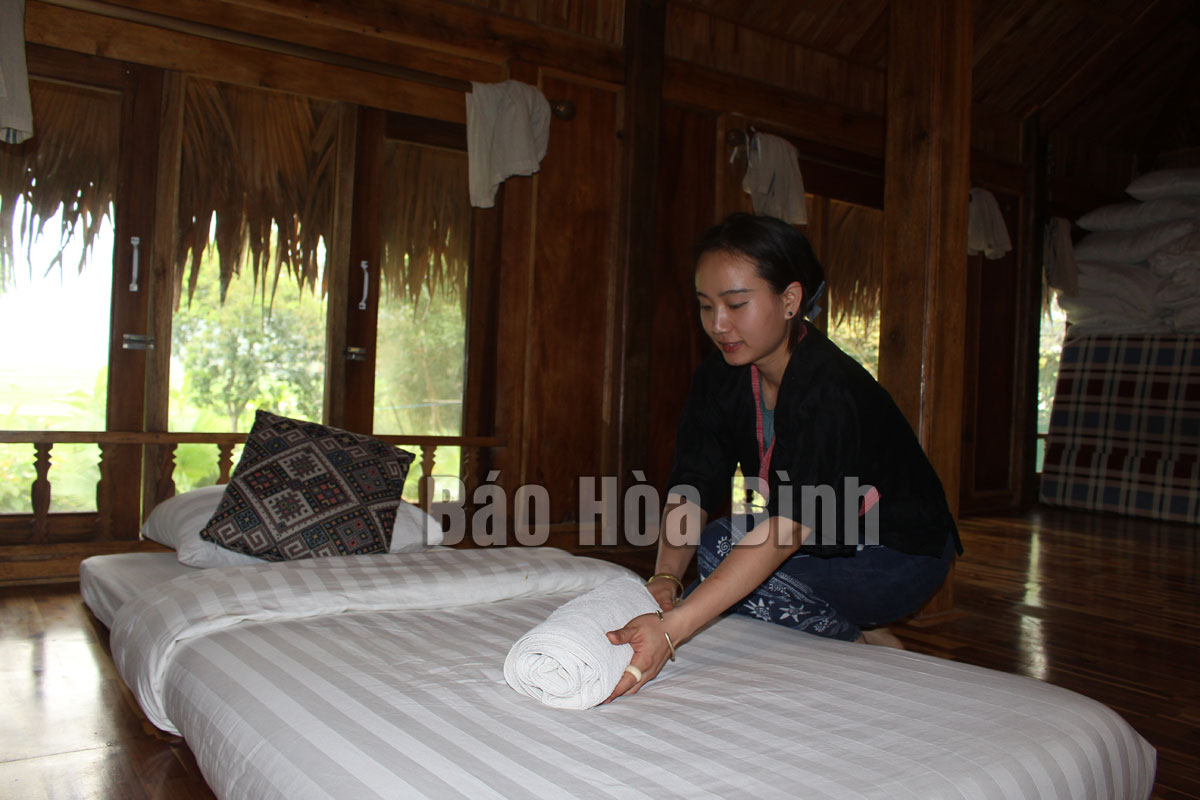
(HBO) - In the past time, rural tourism in Hoa Binh province has developed rapidly with many unique models attracting tourists such as experiencing orange gardens, tea hills or exploring natural reserve centres, craft villages and local culture at community-based tourism sites.
Developing
rural tourism has contributed to raising local residents's incomes. It is a
fundamental solution and a driving force to promote new-style rural area
building in a sustainable way.
Households engaged in community-based tourism in Lac village, Chieng Chau
commune (Mai Chau District) pay attention to improving tourism skills.
The province has potential to develop rural tourism, considering the richness
and diversity of local cultures and lifetyle of the Muong, Thai, Tay, Dao and
Mong ethnic groups that are preserved in each village.Natural
landscapes and unique ecosystems in nature reserve centres are also an
advantage.
Hoa Binh has set up concentrated agricultural areas towards organic production
and VietGAP standard such as fruit growing areas in Cao Phong, Tan Lac, Kim
Boi, Lac Thuy; and safe vegetable production areas in Luong Son district.
With such potential and advantages, the province will focus on developing
various types of rural tourism, mainly agricultural, community-based and
ecological tourism.
In addition to the rapid development of community-based tourism, in recent
years, some localities are paying attention to develop agri-tourism, with Cao
Phong district a typical example. From 2016, the district began welcoming
tourists to local orange gardens. The friendliness and hospitality of the
gardeners along with the beauty of ripe orange orchards have attracted a large
number of visitors.
Dinh Cong Su, Vice Chairman of the provincial People's Committee emphasized
that the tourism industry, with the typical imprint of each region and each
ethnic group, have gradually met the needs of visitors who want to visit and
gain new experiences. As a result, the landscape, environment, cultural and
spiritual life of rural areas have changed significantly, becoming liveable
rural areas.
Rural tourism has created jobs for local people, promoted the consumption of
agricultural products, especially those under the One Commune One Product
model, he said.
It has raised the capacity, knowledge and awareness of rural people while
helping preserve traditional cultural identities.
In the coming time, in order to create a connection between tourism,
agriculture and rural areas towards forming a highly competitive production
value chain, and improving local living conditions, it is necessary for
agencies and localities to coordinate to enhance their responsibilities in
State management of community-based tourism.
Special attention should be paid to areas where ethnic minority people reside.
It is essential to implement a master plan on community-based tourism
development and more investment should be poured in infrastructure.
There should be a close connection between community-based tourism and
agricultural tourism
The development of community-based tourism should be associated with
agri-tourism, craft village tourism and learning about OCOP products in each
locality.
A Phong Linh (Yellow Tabebuia) flower garden in Thang village, Thach Yen commune, Cao Phong district is currently in full bloom, drawing a large number of visitors.
Community-based tourism has been thriving in Pa Co commune, Mai Chau district thanks to advantages in natural landscape and cultural identity.
Doan Ket commune of Yen Thuy district has recently held a ceremony to receive a certificate recognising Ta communal house as a provincial-level historical and cultural relic site.
In Lac Thuy district, the fertile alluvial land along the Boi River is now home to lush green mulberry gardens, marking the emergence of a new agricultural industry - mulberry cultivation and silkworm farming.
Officially opening in February, Ngoi Hoa Ecotourism Site (PriorBay Resort) in Suoi Hoa commune, Tan Lac district, has quickly become a sought-after destination. It offers visitors a chance to indulge in distinctive and enticing experiences.
Gia Trang Heian Homestay, a unique cultural oasis in the heart of Hoa Binh city, has become a compelling attraction for tourists seeking ethnic cultural experiences within an urban setting. Bui Thi Hien, a local in Kim Boi district with aspiration for ethnic culture and community-based tourism development, created the homestay that seamlessly blends traditional and contemporary features.



